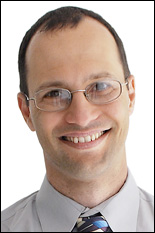 |

|
 |
Professor Benjamin Shapiro. |
|
The Fischell Department of Bioengineering (BioE), the Institute for Systems Research (ISR), the Maryland NanoCenter and the A. James Clark school of Engineering extend their congratulations to Benjamin Shapiro, who was elevated to the rank of Professor effective July 1, 2013.
For Shapiro, it's been an unusual journey, one he sometimes finds himself explaining when asked how and why someone who started out as an aerospace engineer ended up a bioengineer, moving cells around lab-on-a-chip devices and devising new drug delivery techniques.
The answer lies in liquid. As an undergraduate, he specialized in aeronautic fluid dynamics. He pursued an interest in control systems as a graduate student, but the focus was still on jet engines. When he joined the Clark School's Department of Aerospace Engineering and ISR in 2000, his thoughts returned to fluid dynamics, but at a different scale.
"I had just started becoming interested in microfluidics, and fluid flows on small scales," he explains. "As I became serious about it, I realized that most of the high-impact applications were in areas like chemical testing, manipulating cells, and DNA separation?there were far fewer applications in jet engines and spacecraft. All of the problems I studied were leading me toward chemistry and biology, and eventually clinical topics. By the time I took my sabbatical at the National Institutes of Health and the National Institute for Standards and Technology in 2009, I was doing almost exclusively biological and medical research. At that point I thought, you know, it's getting more and more challenging to explain to people why I'm in the aerospace department." By the time he returned in 2010, he had transferred to BioE.
In the end, making the risky, career-changing move was worth it. "It's fantastic," he says, adding that he appreciates his growing connections with the doctors, start-up companies, the NIH and FDA, and with his colleagues on the bioengineering faculty. "There's no question that being surrounded by people who are doing synergistic things is a tremendous benefit. It amplifies my work."
As the director of the Control of Miniaturized Systems for Mechatronic, Biological and Clinical Applications Laboratory his research is focused on all aspects of control of medical devices and drug targeting, from initial determination of the dominant physics, to model development, control problem statement and algorithm design, to experimental verification. In recent years, he has applied his expertise in flow control systems and microelectromechanical systems (MEMS) to a diverse group of research projects, including the development of a new technique for drug delivery to the inner and middle ear, the use of flow control and quantum dots to achieve nanoprecise imaging and fabrication, neonatal ventilator safety, defect-free colloidal crystal assembly for optoelectronic metamaterials, and controlled delivery of chemotherapy to deep tissue tumors using magnetic nanoparticles. He is also the co-editor of and contributor to a book titled Feedback Control from MEMS to Atoms. In 2012 he delivered a plenary talk at the International Conference on Manipulation, Manufacturing and Measurement on the Nanoscale, and he just attended his first Gordon Research Conference.
Shapiro is one of a growing number of BioE faculty who have taken department benefactor and inventor Robert E. Fischell's ideals of entrepreneurship, clinical translation, and interdisciplinary research to heart. Commercialization efforts are underway for some of the technologies he and his colleagues have developed.
"We're really making a push to get the stuff that we're doing here in the lab out to patients," he says. "We want to make sure that the technology we're developing will be in hospitals and clinics."
Shapiro, who received his Ph.D. from the California Institute of Technology in 2000, also holds an appointment with the Maryland NanoCenter, and is affiliated with the Applied Math and Scientific Computation Program. He is the recipient of a 2003 NSF CAREER award and a 2009 Fulbright Scholarship. He has filed 20 patents based on his research, two of which were awarded 1st and 3rd places in the university's annual Office of Technology Commercialization's Invention of the Year competition.
Related Articles:
UMD Researchers Achieve Breakthrough in Nanoprecision Imaging
Shapiro, Depireux team for series of grants to combat hearing loss
July 15, 2013
|